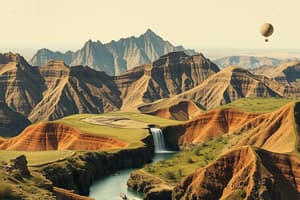Podcast
Questions and Answers
What is the main focus of physical geography?
What is the main focus of physical geography?
- The Earth's natural features and processes (correct)
- Historical events
- Political boundaries
- Man-made structures
Which of the following is NOT analyzed by physical geographers?
Which of the following is NOT analyzed by physical geographers?
- Rivers and lakes
- Climate patterns
- Economic systems (correct)
- Erosion and weathering
How do rivers, lakes, and oceans contribute to the landscape according to physical geography?
How do rivers, lakes, and oceans contribute to the landscape according to physical geography?
- They generate electricity
- They control political boundaries
- They create and modify landforms (correct)
- They cause earthquakes
What is one of the roles of physical geographers?
What is one of the roles of physical geographers?
Which activity is NOT a common role of physical geographers?
Which activity is NOT a common role of physical geographers?
How does physical geography contribute to understanding societies?
How does physical geography contribute to understanding societies?
What is the main focus of Geographic Information Systems (GIS)?
What is the main focus of Geographic Information Systems (GIS)?
Which course would be most useful for someone interested in analyzing satellite imagery?
Which course would be most useful for someone interested in analyzing satellite imagery?
What skills are typically required for physical geography research assistants?
What skills are typically required for physical geography research assistants?
How can understanding landscape processes benefit society?
How can understanding landscape processes benefit society?
What does the discipline of physical geography offer individuals interested in protecting natural resources?
What does the discipline of physical geography offer individuals interested in protecting natural resources?
How can combining geographic knowledge with insights from other disciplines benefit society?
How can combining geographic knowledge with insights from other disciplines benefit society?
Flashcards are hidden until you start studying
Study Notes
Exploring Physical Geography
Physical geography is a branch of geography that focuses on the Earth's natural features and processes, encompassing the study of landscapes, water bodies, climate, and natural resources. This discipline is essential for understanding the world's diverse environments and how they shape societies, economies, and ecosystems.
Landforms and Processes
Physical geographers analyze complex natural systems and the processes that shape them, such as:
- Erosion, deposition, and weathering, which create and modify landforms like mountains, valleys, and plains.
- Rivers, lakes, and oceans, which sculpt the landscape and support diverse ecosystems.
- Climate and atmospheric phenomena, which drive global patterns of precipitation, temperature, and wind.
The Role of Physical Geographers
Physical geographers may work in a variety of settings, including academia, government agencies, non-governmental organizations, and private businesses. Their roles often include:
- Collecting and analyzing data on natural systems to better understand their origin, function, and resilience.
- Assisting with data collection, data analysis, and the dissemination of research findings.
- Developing models and tools to forecast future environmental changes and potential impacts.
- Contributing to the development of policies and management strategies for natural resources and ecosystems.
Recommended Courses and Skills
A well-rounded education in physical geography typically includes a combination of both theoretical and practical courses, such as:
- Introduction to Physical Geography: An exploration of fundamental concepts and principles that underpin the discipline.
- Geographic Information Systems (GIS): The use of technology to collect, analyze, and display spatial data for a wide range of applications.
- Remote Sensing: The acquisition and analysis of data from satellite imagery and aerial photographs.
- Environmental Management: The sustainable use and protection of natural resources, including soil, water, and air.
- Quantitative Methods: The use of statistical and mathematical techniques to analyze spatial data.
Research Assistant Opportunities
Physical geography research assistants typically have strong quantitative and qualitative skills, knowledge of GIS and remote sensing, and an interest in natural processes. They may work on projects related to climate change, ecosystem management, land use planning, and hazard assessment.
The Broader Impact of Physical Geography
Physical geography is more than just a scientific field. It has a profound impact on the way we live and interact with the world around us. For example:
- Understanding the processes that shape landscapes and ecosystems can help us predict and mitigate environmental hazards, such as floods, landslides, and droughts.
- Analyzing the distribution of natural resources can inform decisions about extraction, conservation, and management.
- Combining geographic knowledge with insights from other disciplines, such as sociology and economics, can help us better understand the complex relationships between humans and the environment.
Physical geography is a dynamic and exciting field that offers numerous opportunities for exploration and discovery. Whether you're studying the Earth's natural systems or working to protect them, this discipline has something to offer everyone with an interest in the natural world.
Studying That Suits You
Use AI to generate personalized quizzes and flashcards to suit your learning preferences.




